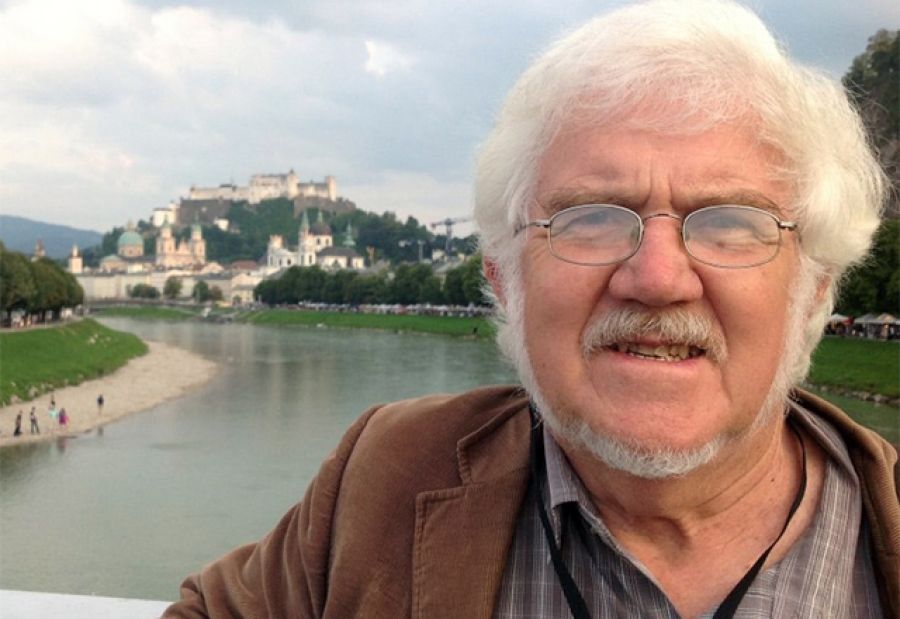
- Free Article: No
- Contents Category: Poet of the Month
- Custom Article Title: Geoff Page is Poet of the Month
- Review Article: No
- Online Only: No
- Custom Highlight Text:
Public oratory and prose fiction both need a significant degree of rhythm, but for almost all poetry (including free verse) rhythm is indispensable. Both genres use the 'sound effects' of assonance, alliteration, etc., but verbal music is more important to poetry than to prose.
ARE POEMS 'INSPIRED' OR THE PRODUCT OF CRAFT?
The original idea is usually beyond one's control: i.e. it's 'given' – as is the final result, in a sense. There's usually a lot of hard work between those two points, however.
WHAT PROMPTS A NEW POEM?
Dreams, conversations, obsessive interests, moral and political annoyance, other people's poems (that remind you faintly of one you now realise you'd always intended to write), research (on one poem which can lead to another), etc, etc.
WHAT'S THE DIFFERENCE BETWEEN POETRY AND PROSE?
Public oratory and prose fiction both need a significant degree of rhythm, but for almost all poetry (including free verse) rhythm is indispensable. Both genres use the 'sound effects' of assonance, alliteration, etc., but verbal music is more important to poetry than to prose.
WHAT CIRCUMSTANCES ARE IDEAL FOR WRITING POETRY?
Two or three hours of uninterrupted silence for the first draft. Revision can be done anywhere. Cafés are good. Feedback from a trusted reader is also important.
WHICH POET WOULD YOU MOST LIKE TO TALK TO – AND WHY?
William Carlos Williams, the Rutherford (New Jersey) doctor, who wrote fifty books (of all kinds) while working full-time. My poetry no longer shows much of his influence, but he remains an inspiration. Gwen Harwood would be good too. I did speak to her fleetingly a few times at writers' festivals.
WHAT DO POETS NEED MOST: SOLITUDE OR A COTERIE?
Poets, away from their desks, tend to be collegial (much more so than novelists). Poets often help one another to become more established, but a coterie is taking things too far. Coteries are too quick with their congratulations.
WHAT HAVE YOU LEARNED FROM REVIEWS OF YOUR WORK?
Having written many reviews myself, I try not to take excessive notice of them, be they positive or negative. They're important bearers of news, however. It's almost universal for poets to remember the single reservation made by a reviewer when all else was praise. That reservation may (or may not) be useful.
IF PLATO ALLOWED YOU TO KEEP ONE POEM OR POETRY COLLECTION IN HIS REPUBLIC, WHAT WOULD IT BE?
I've not much time for philosopher–kings (no matter how benign) but it'd be good to have Judith Wright's Collected Poems in a secret cupboard somewhere.
DO YOU HAVE A FAVOURITE LINE OF POETRY (OR COUPLET)?
'I am his Highness' dog at Kew; / Pray tell me, sir, whose dog are you?' (Alexander Pope)
IS POETRY GENERALLY APPRECIATED BY THE READING PUBLIC?
Poetry is a fairly demanding form for the most part; it's not a surprise that some people have no wish to make the effort. There's no real reason, however, why poetry should not be at least as popular as literary fiction. The human need for story and for patterned language go equally far back in history (well before writing was invented).
GEOFF PAGE is based in Canberra and has published twenty-two collections of poetry as well as two novels and five verse novels. His recent books include 1953 (2013), Improving the News (2013), New Selected Poems (2013), Aficionado: A jazz memoir (2014), Gods and Uncles (2015) and PLEVNA: A verse biography (2016). He also edited The Best Australian Poems 2014 and The Best Australian Poems 2015.


Comments powered by CComment